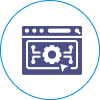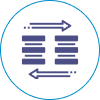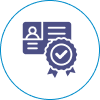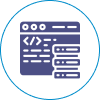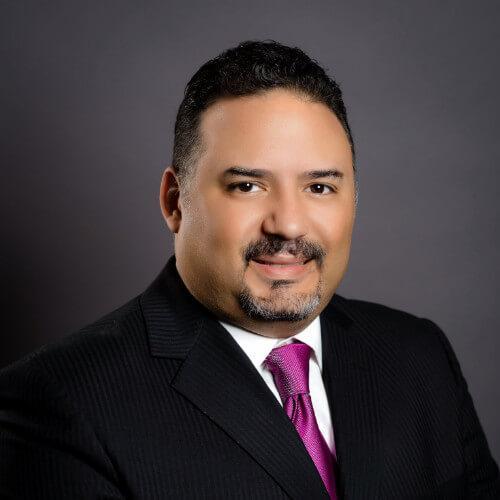In industries where PHP-based applications are common and continuous integration, deployment, and
infrastructure management are required, PHP DevOps engineers are usually hired. The following are some of
the major Indian industries that frequently employ PHP DevOps engineers:
Businesses that manage extensive e-commerce platforms frequently employ in-house
developed solutions or PHP frameworks like Magento and WooCommerce. For the purpose of overseeing
the scalability, high availability, and management of the infrastructure supporting these platforms,
DevOps engineers are essential.
PHP frameworks are frequently used by EdTech businesses that offer educational
content management systems or online learning platforms. The infrastructure supporting these
platforms is managed in part by DevOps engineers, who make sure everything runs smoothly during
periods of high utilization.
PHP can be used for practice management software, telemedicine platforms, patient
portals, and other applications by healthcare companies and entrepreneurs in the health tech space.
The security, scalability, and compliance of these systems with healthcare laws are guaranteed by
DevOps engineers.
PHP is used by a few fintech organizations and financial institutions for internal
systems and customer-facing applications. To keep these vital systems secure, compliant, and highly
available, we require DevOps engineers.
PHP is a major component of many different industries' web applications. These
businesses frequently implement DevOps techniques at an early stage in order to manage cloud
infrastructure, automate development processes, and guarantee effective deployment.
PHP is frequently used by businesses in this industry to create web portals,
content management systems (CMS), and digital publishing platforms. In order to maintain the
infrastructure that hosts these platforms and make sure it can withstand periods of high traffic,
DevOps engineers are essential.
Software Development Agencies:
PHP is widely used by companies that specialize in custom software development to
create solutions for their clients. The development lifecycle is streamlined, team collaboration is
enhanced, and the stability of deployed apps is guaranteed by DevOps engineers.
PHP can be used for backend services by businesses creating social gaming apps or
online gaming platforms. To enable a flawless gaming experience, DevOps engineers manage databases,
automate deployment procedures, and enhance server speed.
Exclusive list of Interview Questions asked when you Hire PHP DevOps Engineer in India
PHP Development Questions:
What is PHP?
PHP (Hypertext Preprocessor) is a server-side scripting language designed for web development.
What are some key features of PHP?
Features include:
- Simplicity and ease of use
- Integration with many popular databases
- Extensive libraries and frameworks
- Support for object-oriented programming
- Compatibility with all major operating systems
Explain the difference between include, include_once, require, and require_once in PHP.
include and require include a file during script execution. include_once and require_once ensure that the file is
included only once to avoid multiple inclusions.
What are PHP sessions? How do you manage them?
Sessions allow you to store user-specific data on the server for stateful applications. They are managed using
session_start() to initiate a session and $_SESSION to store and retrieve values.
How does PHP handle data types?
PHP supports several data types including integers, floats, strings, booleans, arrays, and objects. It uses
dynamic typing.
Explain what MVC (Model-View-Controller) is and how it is used in PHP development.
MVC is a design pattern separating application logic into three interconnected components: the Model (data
handling), View (user interface), and Controller (logic handling user input). PHP frameworks like Laravel and
Symfony use MVC.
What are PHP traits? How do they differ from classes?
Traits are a mechanism for code reuse in single inheritance languages like PHP. They are similar to classes but
intended to group functionality in a fine-grained and consistent way.
DevOps Questions:
What is DevOps? Why is it important?
DevOps is a set of practices that combines software development (Dev) and IT operations (Ops). It aims to shorten
the system development lifecycle and deliver high-quality software.
Describe your experience with CI/CD (Continuous Integration/Continuous Deployment).
CI/CD is a DevOps practice where code changes are automatically built, tested, and deployed to production.
Discuss tools used (e.g., Jenkins, GitLab CI/CD) and your role in implementing pipelines.
How would you ensure the security of a PHP application in a DevOps environment?
Implement security practices such as code scanning (e.g., SonarQube), dependency management (e.g., Composer), and
environment hardening (e.g., secure configurations, access controls).
What tools have you used for containerization and orchestration?
Docker for containerization and Kubernetes for orchestration are common tools. Discuss your experience in
creating Docker images, managing containers, and deploying applications using Kubernetes.
How do you monitor the performance of PHP applications in a production environment?
Use monitoring tools like New Relic, Nagios, or Prometheus to track metrics such as response time, CPU usage,
memory usage, and database queries. Discuss how you identify and resolve performance bottlenecks.
Explain how you handle database migrations and version control in a PHP project.
Use migration tools provided by frameworks like Laravel or write SQL scripts for database schema changes. Version
control is managed using Git or other VCS to track changes and collaborate with the team.
Frequently Asked Questions
What is a PHP DevOps engineer?
A PHP DevOps engineer is a professional who combines expertise in PHP development with skills in DevOps
practices. They manage the infrastructure, deployment pipelines, and automation processes for PHP applications.
What skills should a PHP DevOps engineer possess?
Key skills include proficiency in PHP programming, knowledge of DevOps tools like Docker, Kubernetes, Jenkins,
etc., experience with cloud platforms (AWS, Azure, GCP), scripting languages (Bash, Python), and expertise in
CI/CD pipelines.
What are the typical responsibilities of a PHP DevOps engineer?
Responsibilities often include designing and implementing CI/CD pipelines for PHP applications, managing
infrastructure as code (IaC), monitoring application performance and scalability, ensuring security best
practices, and collaborating with development and operations teams.
Why is hiring a PHP DevOps engineer important?
Hiring a PHP DevOps engineer ensures seamless integration of development and operations, improves deployment
efficiency, enhances scalability, and automates routine tasks, thereby optimizing the overall development
lifecycle.
What are some interview questions for hiring a PHP DevOps engineer?
Interview questions could cover topics like experience with PHP frameworks (e.g., Laravel, Symfony),
understanding of containerization (Docker), knowledge of configuration management tools (Ansible, Chef),
troubleshooting skills for PHP applications, and familiarity with monitoring tools.
What qualifications should I look for in a PHP DevOps engineer?
Look for candidates with a bachelor’s degree in Computer Science or related field (or equivalent experience),
certifications in DevOps or relevant technologies (AWS Certified DevOps Engineer, Docker Certified Associate),
and a proven track record of deploying and managing PHP applications in a production environment.
How can a PHP DevOps engineer contribute to business growth?
They contribute by reducing deployment time, improving application reliability, optimizing infrastructure costs
through automation, and ensuring that PHP applications can scale efficiently to meet business demands.
What are some best practices for integrating PHP development with DevOps?
Best practices include using version control systems (e.g., Git), implementing automated testing (unit,
integration), adopting continuous integration and delivery (CI/CD) pipelines, leveraging infrastructure as code
(IaC), and monitoring application performance.
How do PHP DevOps engineers handle security challenges?
They implement security best practices such as regular vulnerability scanning, secure configuration management,
adherence to compliance standards (e.g., GDPR, HIPAA), and integration of security testing (static analysis,
penetration testing) into CI/CD pipelines.
What are the current trends in PHP DevOps?
Current trends include the adoption of serverless architecture for PHP applications, increased use of Kubernetes
for container orchestration, advancements in CI/CD automation tools, and integration of AI/ML for optimizing
application performance and scalability.













